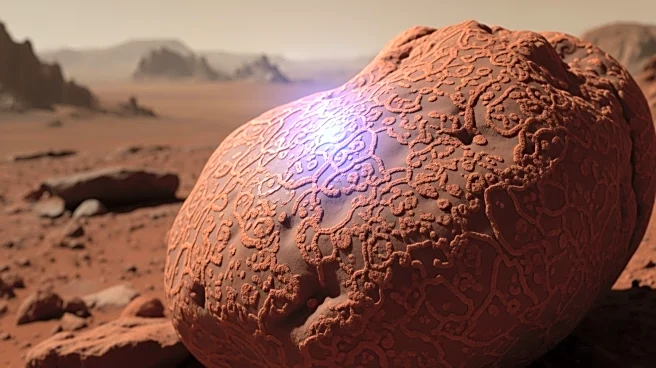What's Happening?
NASA's Perseverance rover has made a significant discovery on Mars, uncovering a mudstone rock in the Jezero Crater that contains organic molecules and minerals such as vivianite and greigite. These compounds
are typically associated with microbial activity on Earth, leading scientists to consider this finding a 'potential biosignature.' This discovery is the most compelling evidence yet of the possibility of past life on Mars, although it is not definitive proof. The rover's analysis of the rock, nicknamed 'Cheyava Falls,' revealed peculiar dark speckles and ring-like discolorations, which prompted further investigation.
Why It's Important?
The discovery of a potential biosignature on Mars is a major milestone in the search for extraterrestrial life. If confirmed, it could reshape our understanding of life's existence beyond Earth, impacting scientific theories and future space exploration missions. The presence of organic molecules and minerals typically formed by microbial activity suggests that Mars may have once harbored life, which could influence future missions to the Red Planet. This finding also underscores the importance of continued investment in space exploration and the potential for international collaboration in studying Mars's geological history.
What's Next?
NASA plans to further analyze the samples collected by Perseverance, with the possibility of returning them to Earth for more detailed examination. The Mars Sample Return mission, which aims to bring these samples back, faces budgetary challenges but remains a priority for NASA. In the meantime, Perseverance will continue to explore the Jezero Crater, collecting additional samples and data. The scientific community is eagerly awaiting more findings, which could provide further insights into Mars's past environment and its potential to support life.
Beyond the Headlines
The discovery raises ethical and philosophical questions about humanity's place in the universe and the implications of finding life beyond Earth. It also highlights the technological advancements in space exploration, as the Perseverance rover's sophisticated instruments enable detailed analysis of Martian geology. The potential confirmation of past life on Mars could lead to increased interest and funding for space missions, as well as inspire a new generation of scientists and explorers.











